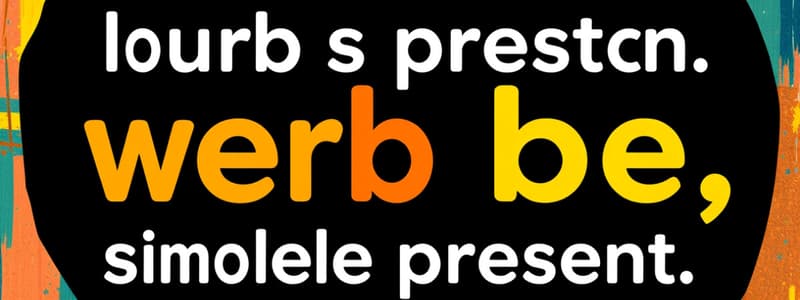Podcast
Questions and Answers
Which sentence correctly uses the verb 'be' in the affirmative form?
Which sentence correctly uses the verb 'be' in the affirmative form?
- You are my friend. (correct)
- I are from Canada.
- He am a doctor.
- They is happy.
What is the correct negative form of 'She is a musician'?
What is the correct negative form of 'She is a musician'?
- She aren't a musician.
- She am not a musician.
- She is no musician.
- She is not a musician. (correct)
Which questions correctly follow the interrogative form of the verb 'be'?
Which questions correctly follow the interrogative form of the verb 'be'?
- Is you happy?
- Are he here?
- Are we late? (correct)
- Am they at home?
Which example correctly illustrates a state or condition using the verb 'be'?
Which example correctly illustrates a state or condition using the verb 'be'?
Which option shows the correct subject-verb agreement with the verb 'be'?
Which option shows the correct subject-verb agreement with the verb 'be'?
Flashcards are hidden until you start studying
Study Notes
Verb "Be" in Simple Present
-
Forms of the verb "be":
- Affirmative: am, is, are
- First person singular: I am
- Second person singular: You are
- Third person singular: He/She/It is
- First person plural: We are
- Second person plural: You are
- Third person plural: They are
- Affirmative: am, is, are
-
Negative Form:
- Use "not" after the verb.
- I am not
- You are not (or you aren’t)
- He/She/It is not (or isn’t)
- We are not (or aren’t)
- You are not (or aren’t)
- They are not (or aren’t)
- Use "not" after the verb.
-
Interrogative Form:
- Invert the subject and verb.
- Am I?
- Are you?
- Is he/she/it?
- Are we?
- Are you?
- Are they?
- Invert the subject and verb.
-
Use Cases:
- To indicate existence or identity.
- Example: She is a teacher.
- To describe a state or condition.
- Example: They are happy.
- To express time or location.
- Example: The meeting is at 3 PM.
- To indicate existence or identity.
-
Common Expressions:
- "I am from..." (indicating origin)
- "You are welcome" (politeness)
- "It is what it is" (acceptance)
-
Tips:
- Remember subject-verb agreement (use "is" for singular subjects and "are" for plural).
- Be mindful of contractions (e.g., "he’s" for "he is").
Forms of the Verb "Be"
- Affirmative forms include "am," "is," and "are."
- First person singular is expressed as "I am."
- Second person singular is "You are."
- Third person singular uses "He is," "She is," or "It is."
- First person plural is "We are."
- Second person plural again is "You are."
- Third person plural is "They are."
Negative Form
- The negative is formed by adding "not" after the verb.
- Examples include: "I am not," "You are not" (or "You aren’t"), and "He is not" (or "He isn’t").
- The negative applies similarly for other subjects: "We are not" (or "We aren’t"), "You are not" (or "You aren’t"), and "They are not" (or "They aren’t").
Interrogative Form
- The question format requires inverting the subject and the verb.
- Examples include: "Am I?", "Are you?", "Is he/she/it?", "Are we?", "Are you?", and "Are they?"
Use Cases
- Indicates existence or identity with examples like "She is a teacher."
- Describes a state or condition, such as "They are happy."
- Expresses time or location as illustrated in "The meeting is at 3 PM."
Common Expressions
- "I am from..." signifies origin.
- "You are welcome" is used for politeness in response.
- "It is what it is" conveys acceptance or acknowledgment of a situation.
Tips
- Ensure subject-verb agreement: use "is" with singular subjects and "are" with plural subjects.
- Be aware of contractions; e.g., "he’s" for "he is" is commonly used in informal speech.
Studying That Suits You
Use AI to generate personalized quizzes and flashcards to suit your learning preferences.




